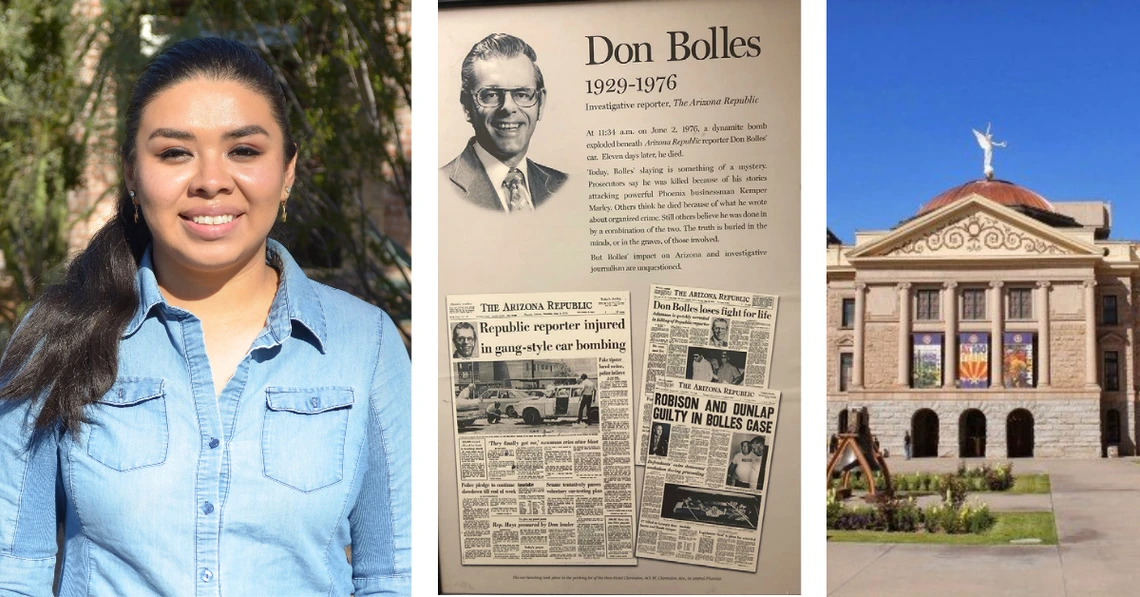Bolles recipient Gomez to cover Legislature
Arizona Mirror editors will mentor the senior under a new partnership with the J-school

Gloria Gomez, who received the Don Bolles Fellowship, will cover the state Legislature in spring 2022.
Inspired by one political event to become a journalist, University of Arizona student Gloria Gomez will spend the final semester of her senior year in Phoenix, reporting on the politics of the state Legislature as a Bolles Fellow under a new partnership with the Arizona Mirror.
Initially after high school, Gomez felt unsure of what to do for her career. All that changed in November 2016.
“I never really thought about journalism until … the 2016 election happened and I felt helpless and a little upset,” said Gomez, 26, who was working as a special education aide and a respite care provider at the time. “A lot upset. I thought, ‘where could I help? I should go back to college.’”
The Prescott native enrolled at the University of Arizona, dual-majoring in journalism and political science.
“My big interests are immigration or border reporting,” said Gomez, whose parents are originally from a small town a few hours away from Mexico City. “I’ve always been interested in politics and how government action and legislation can affect the individual, especially marginalized communities.”
The Don Bolles Fellowship provides a housing and expenses’ stipend to a student to use for a semester while covering the Legislature in Phoenix, The fellowship was named after Don Bolles, an Arizona Republic investigative reporter killed by a car bomb in 1976, and is funded by the Armin and Esther Hirsch Foundation.
For the first time since the fellowship started in 1977, the school is partnering with an outside news outlet — the Arizona Mirror — to mentor the Bolles recipient during the semester. The Mirror, an independent, nonprofit news organization, is based at the Arizona Capitol and focuses on connecting public policy with the people it affects.
Mirror associate editor Jeremy Duda, a 2002 UA J-school grad, and editor Jim Small will show Gomez the ins and outs of the Legislature, collaborate on story ideas and help improve her writing and reporting.
“There’s no substitute for in-person experience,” Duda said. “The [legislature] can be very daunting. There’s a lot to learn very quickly. The legislative session, even for experienced capitol reporters, can be a lot to deal with all at once. Hundreds of bills, committee hearings around the clock. If you haven’t been there, there’s so many new people to learn. You have to learn the rules and procedures for how things go. That’s not something you can learn from a classroom.”
Gomez will work out of the Mirror’s office, which is, according to Duda, “a few minutes’ walk” from the capitol. The stories she will write, both assigned and pitched, will appear on the Mirror’s website. There’s also the possibility of her work appearing nationally, thanks to the Mirror’s affiliation with the States Newsroom media network.
“[The Bolles Fellowship] taught me a lot about how to build stories during unsupervised time on the job, which is a hugely important skill for journalists particularly today with most work being remote,” said Kellie Mejdrich (’12) the 2012 Bolles Fellow who currently is a journalist for Law360 after stints at Politico and Congressional Quarterly.
So far, Gomez’s writing experience has come from the Daily Wildcat, where she worked for two semesters, and an apprenticeship at the Arizona Daily Star.
“I have a little bit of experience writing, but not a whole lot of experience,” said Gomez, who is bilingual. “There’s always more I can learn and tightening up my writing is something I want to do. Working with people who are experts in reporting the news and especially public affairs news, where you have to have very clean prose and very straightforward ledes, is something I’m excited about. I like learning from people.”
Working at the legislature will give Gomez a crash course in learning to interview subjects.
“[The Fellowship] gave me some of the best and most realistic public official hallway/scrum style interviewing experience at that point in my career,” Mejdrich said.
Having the chance to interview legislators in-person will give Gomez a leg-up on the competition when she enters the job market. She has her eye on a few newspapers for her first job after graduation, though she hopes to ultimately end up living “where the news is.”
“You can watch all these things online—floor proceedings, committee hearings, etc., but there’s no substitute for being there in person,” Duda said. “A lot of these people aren’t going to answer their phones if you want to talk to them. The only way to get some legislators to talk on the record is to corner them at the legislature as they’re coming off the floor. You walk over to the capital and you start running into people, start talking to them and finding out what’s going on. There’s no substitute for being there in person and being able to talk to people in real time and cover these things as they happen.”

